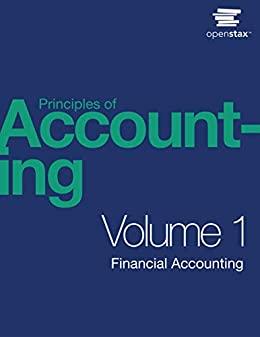Question
The following data relate to the operations of Shilow Company, a wholesale distributor of consumer goods: Current assets as of March 31: Cash $ 7,700
The following data relate to the operations of Shilow Company, a wholesale distributor of consumer goods:
| Current assets as of March 31: | ||
| Cash | $ | 7,700 |
| Accounts receivable | $ | 20,800 |
| Inventory | $ | 40,800 |
| Building and equipment, net | $ | 129,600 |
| Accounts payable | $ | 24,300 |
| Common stock | $ | 150,000 |
| Retained earnings | $ | 24,600 |
-
The gross margin is 25% of sales.
-
Actual and budgeted sales data:
| March (actual) | $ | 52,000 |
| April | $ | 68,000 |
| May | $ | 73,000 |
| June | $ | 98,000 |
| July | $ | 49,000 |
-
Sales are 60% for cash and 40% on credit. Credit sales are collected in the month following sale. The accounts receivable at March 31 are a result of March credit sales.
-
Each months ending inventory should equal 80% of the following months budgeted cost of goods sold.
-
One-half of a months inventory purchases is paid for in the month of purchase; the other half is paid for in the following month. The accounts payable at March 31 are the result of March purchases of inventory.
-
Monthly expenses are as follows: commissions, 12% of sales; rent, $2,500 per month; other expenses (excluding depreciation), 6% of sales. Assume that these expenses are paid monthly. Depreciation is $972 per month (includes depreciation on new assets).
-
Equipment costing $1,700 will be purchased for cash in April.
-
Management would like to maintain a minimum cash balance of at least $4,000 at the end of each month. The company has an agreement with a local bank that allows the company to borrow in increments of $1,000 at the beginning of each month, up to a total loan balance of $20,000. The interest rate on these loans is 1% per month and for simplicity we will assume that interest is not compounded. The company would, as far as it is able, repay the loan plus accumulated interest at the end of the quarter.
Required:
Using the preceding data:
1. Complete the schedule of expected cash collections.
2. Complete the merchandise purchases budget and the schedule of expected cash disbursements for merchandise purchases.
3. Complete the cash budget.
4. Prepare an absorption costing income statement for the quarter ended June 30.
5. Prepare a balance sheet as of June 30. Required 1:
Complete the schedule of expected cash collection
| ||||||||||||||||||||||||||
Required 2:
Complete the merchandise purchases budget and the schedule of expected cash disbursements for merchandise purchases.
| |||||||||||||||||||||||||||||||||||||||||||||||||||||||||||||||||||||||||||||||||
Required 3:
Complete the cash budget. (Cash deficiency, repayments and interest should be indicated by a minus sign.)
| |||||||||||||||||||||||||||||||||||||||||||||||||||||||||||||||||||||||||||||||||||||||||||
Question is too long so I could not include the charts for 4 and 5
Step by Step Solution
There are 3 Steps involved in it
Step: 1

Get Instant Access to Expert-Tailored Solutions
See step-by-step solutions with expert insights and AI powered tools for academic success
Step: 2

Step: 3

Ace Your Homework with AI
Get the answers you need in no time with our AI-driven, step-by-step assistance
Get Started


